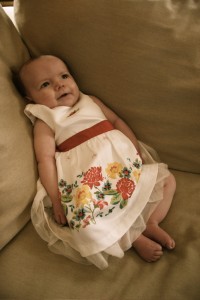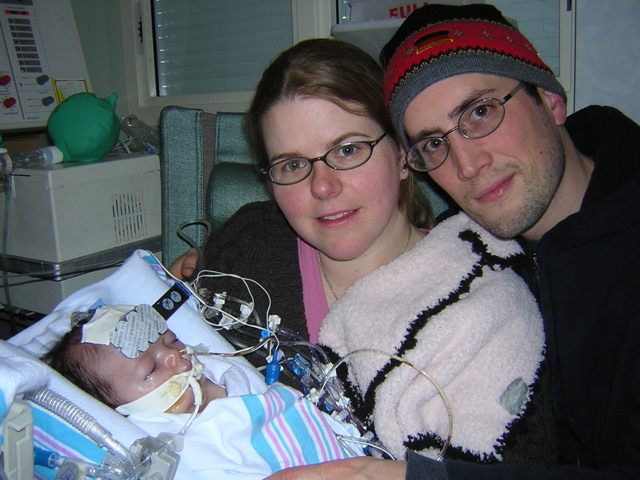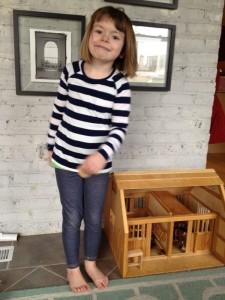Thu 28 Feb 2013
Many Mansions, Part Three
Posted by Jane under Updates
[9] Comments
When we got to the hospital the cardiology team was there to greet us. Ramona was off of the heart lung bypass machine but her oxygen levels were still just half of what they should have been, even though they had accomplished what they had intended during the surgery. At some point we were again taken into a Panic Room. This time there was a beverage and snack cart. I have learned since then that the beverage and snack cart is reserved for the worst news only. While I picked at a muffin, the doctors explained that the cardiac catheterization had shown that Ramona had virtually no blood flow directly from her heart to her lungs. They had done their best to create a “patch” to direct blood in the right direction but she was not responding as well as they had hoped. They were concerned that even if she survived the surgery, she might not survive the night.
I don’t know what happened in my head at that moment. I guess I snapped, but to me it felt more like exploding and sinking and breaking apart. I began weeping. I lashed out at the doctors. I suggested they give her a heart transplant and accused them of being too lazy to consider all options. I demanded that they unplug her from everything and give her back the way she had been when I brought her in. I stormed out of the room and beat on the walls in the hallway. I could not stop crying and shouting. I held my head in my hands and slowly rocked back and forth. I just stood there in the middle of the hospital, crying and moaning.
I don’t remember much about the next few hours. I know I had to find a breast pump because I had no baby to nurse and too much milk. I know they brought us in to see Ramona. She was puffy, grey and completely still except for the slow mechanical rise and fall of her chest as the ventilator breathed for her. It was late and I hadn’t slept in two days. Housekeeping set up cots in the waiting room for Andy and me. His closest friend agreed to sit by Ramona’s bedside overnight. Before I fell asleep I said, “Can someone wake me up if she dies?”
I woke up at 5:30 the next morning. When I walked into her room it was jammed with machines and IV poles. Things were beeping quietly. The nurse was walking around the room turning things off and on and whispering to Ramona’s still little body as she adjusted dressings and propped up her tiny limbs. Because of swelling they had been unable to close her incision so I could just make out the beating of her heart under the clear plastic film and gauze that was covering her open chest. But her oxygen levels were rising! Over the next few days they slowly reduced some of the life-support measures. They closed her incision. Big machines were turned off and rolled away. Her recovery was a roller coaster of ups and downs. There were moments of terror almost every day, but she was making steady progress.
A few weeks into our hospital stay someone stopped by to tell us Ramona had 22q11 Deletion Syndrome, sometimes known as DiGeorge or VCFS, a genetic condition caused by a small missing piece of the 22nd chromosome. We were told that 22q11 was the underlying cause of her heart defect and a possible predictor of more than 100 other medical problems and symptoms. We were told to expect learning difficulties, psychiatric issues, speech delays and global developmental delays. The geneticist examined her and found no other obvious physical defects. Everyone was very matter-of-fact. They told us several times that we hadn’t done anything to cause her 22q, that it was a random mutation. But something happened at conception and although I don’t think I’ve ever said it out loud, I thought I had done something wrong. And if it really wasn’t my fault, if it really was just a random mutation, then the world was suddenly an unpredictable and dangerous place where anything, anyone, at anytime was vulnerable. I wish I could say that I’ve left the guilt behind and never looked back, but I haven’t. I can manage it, but I can’t dispel it entirely.
I also wrestled with accepting the amount of time, energy and money that was being used to keep Ramona alive. I wondered if it was wrong to fight so hard to save her when the millions of dollars spent on her care could likely have saved thousands of children from disease and hunger in other parts of the world. Whenever those dark thoughts would overwhelm me, I would go back to that moment in that little room with the complimentary snacks reserved for very, very bad news. In that moment I would have plucked out my right eye for the chance to see and hold her again “the way she was” just one more time. My mother’s heart didn’t care about all those other children. I just wanted my Ramona Mae to live.
Learning that our child had a “syndrome” devastated me. Her heart defect was scary, but seemed fixable. I had convinced myself that if we could just get her heart repaired and bring her home we could put it all behind us. To learn that every cell in her body was incomplete seemed so unfixable and hopeless. I was in an uncharted wilderness of worry and despair. How could God have answered my prayers for a perfect family with such a calamity? How could we ever be happy again? When I shared my thoughts with Andy, he listened quietly and nodded. But later, when he was holding Ramona, I overheard him softly saying, “We love you just like you are. We’re all missing something. Don’t worry about it baby.”
He knew instinctively what I had to learn. We’re all missing something. Just like every cell in Ramona’s body is missing some genetic information, we are all depleted. It’s part of our fallen nature. But we manage to find joy, overcome obstacles and face our limitations. I began in that moment to form new hopes for Ramona: that she would discover her gifts and talents, that she would not sweat any closed doors that she might face and that she would accept her status as a child of God; incomplete on earth, but perfect in His sight.
Ramona came home from the hospital after five weeks with a feeding tube and on 24-hour oxygen. She required 17 different doses of various medicines that were given around the clock, day and night. She was on methadone and Ativan to treat the symptoms of narcotics withdrawal. We hired a nanny to sleep in our home 3 nights a week. Because her feeding pump ran at night someone had to stay in her room all night, preferably awake, to keep an eye on her. Andy and I each stayed up two of those nights and the night nanny stayed up three. We also had to care for and find a way to be available to Simon. During Ramona’s first hospital stay Simon got his first tooth and learned to walk. We didn’t want to miss any more of his babyhood. The doctors told us it might take years for Ramona’s long-term prognosis to become clear. They told us that because of the seriousness of her heart defect she might not survive into adulthood. Ramona’s illness was not a one-time catastrophe. It was a chronic crisis with no end in sight. How could we create a loving, happy home for our family when one of our members required surgery every four to six months just to keep breathing? How should we parent a child with such an uncertain future?
We were lucky. Friends, family, neighbors and coworkers came out of the woodwork to offer help and advice. I don’t know why it was so hard for me to accept help. Maybe it was because I had always thought of myself as a capable and independent woman. Maybe it was because I couldn’t imagine how I would ever repay all the kindness that was being offered. But like it or not, we accepted almost every offer of help we got and I learned that it felt good to let people do things for me. I learned that when something bad happens to someone they love, people don’t know what to say so they want to do something concrete to show you they care. Sometimes people would just show up at the door. And that was fine. We could always use an extra set of hands. The people who helped us the most at that time were the ones who just showed up, emotionally and physically, to help us with the task at hand.
There’s an essay out there about having a child with special needs called “Welcome to Holland.” Here’s the premise: If you were planning on going to Italy for your honeymoon but were dropped off in Holland instead, you would be initially disappointed because you had packed all the wrong stuff and were expecting pizza and gondolas. But eventually you would figure out that Holland has it’s own perks, like wooden shoes. I think this is a charming story and a good way to describe the bewilderment and overwhelm that comes along with discovering that parenting your child is going to be different than you thought.
But here’s my dilemma: What if I don’t want to go to Holland, even after I’ve checked it out and sampled the notorious wares of Amsterdam? What if I still just really have my heart set on Italy? Plus, it’s a flawed analogy. Wooden shoes and tulips may be just as good as gondolas and chianti but having your child subjected to tests, surgeries and prolonged hospitalizations is not as good as having a happy, healthy child in your arms.
I sometimes have dreams with such an overwhelming sense of anxiety and dread that it is a relief to wake up. This is what caring for a medically fragile child seemed like to me. It was a bad dream from which you would never wake. But I also have another kind of recurring dream. A dream where I discover a secret room in my house that I never knew was there. Sometimes in dreams I find that outside of my basement window is a massive abandoned green house populated by the most beautiful trees and birds. Or a door at the back of a closet that leads to another wing of our house. And it has a hot tub.
The wonder, sacredness and mystery I feel as I pass into the secret places in my dreams is so wonderful. It brings to mind John 14:2, “In my Father’s house there are many mansions.” It turns out that’s what Ramona brings to our life. She’s a portal that leads to places in our hearts we didn’t know were there, mysterious and fearsome places. Sacred places. And we get that now, here on Earth. Our love for Ramona and what her genetic condition brings to our family is really a piece of the Kingdom of God.
Ramona’s future will not be revealed to us today or tomorrow. We’re in it for the long haul and we have to be patient. And yet, we don’t just have to sit back and feel powerless. We should pursue the best treatment, the most compassionate care and give her the richest life we can every day. We can acknowledge that the doctors know a lot, but not everything, and be persistent in following our instincts. But we have to be flexible. We have to accept that the things we would plan and choose for Ramona may or may not come to pass. Sometimes well-meaning friends praise our strength and tell us how amazing we are as parents. I always say thank you but I’m not Super Mom and I’m no saint. I yell at my kids, I wear “yoga” pants almost every day and the inside of my minivan looks like a forgotten science experiment. The one who really deserves praise and amazement is Ramona. She is a lion of courage. She is a mini-mystic. She is a beacon of hope and a vision of what God’s love can be. I no longer despair. These days I wonder, “How could we ever have been happy without her?”
Ramona’s last open-heart surgery left her with more oxygen and energy than she’s ever had before. For the first time in her life the doctors talk about her long-term prognosis in hopeful tones. She can do so many things today that I never thought possible. She can play tag, walk to school and ride a bike. She can skip, stand on one foot and swing from the monkey bars. Now that years have passed since her diagnosis, it’s hard to imagine what our lives might have been if she had been born heart-healthy and with her whole 22nd chromosome. Without a doubt, we would have less grey hair and have gotten a lot more sleep. But I choose everyday to focus on the things we’ve learned and the relationships we’ve developed. Sometimes I wish I could have known back then that not all of the doctor’s dire predictions would come true. But deep down I’m grateful for the trials and the despair of those early days. That Ramona has lived, struggled and persevered is the greatest gift of my life. She has revealed to me the secret places in my heart and it is in those rooms, those many mansions, that gratitude, compassion and abiding faith have taken hold.



